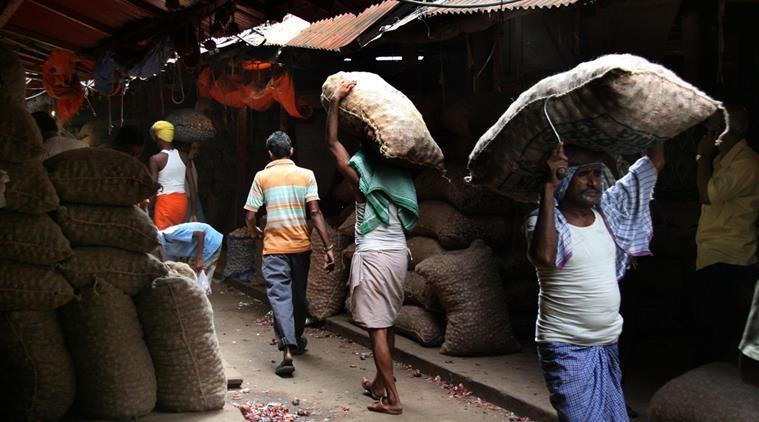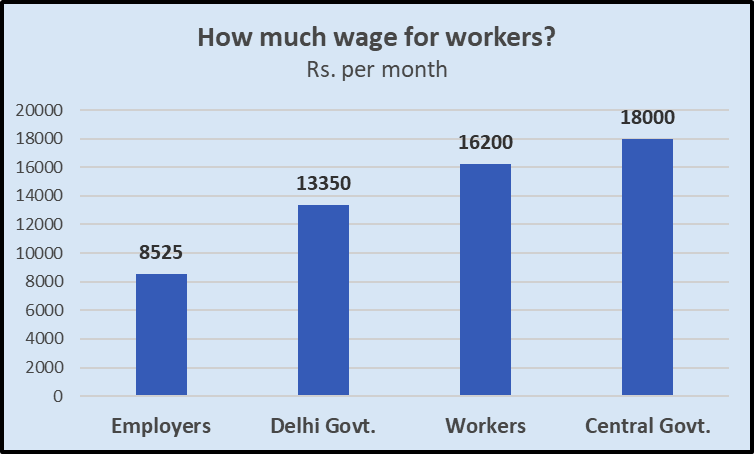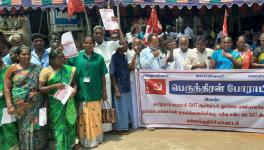Savage Dreams of the Capitalist Class

Delhi’s industrialists had proposed that minimum wages of unskilled workers in the metropolis should be pegged at just Rs.8525 per month flying in the face of all accepted standards, precedents and the prevailing conditions. This bizarre demand was made by employers’ representatives who were members of the Minimum Wage Advisory Committee set up by the Delhi Govt. to recommend a new statutory wage level. These members were Mrs. Alka Kaul (CII), B.P. Pant (FICCI) and G.P. Srivastava (ASSOCHAM), besides representatives from DMRC and PWD. They claimed that they had studied the current prices of essential commodities and costs of other necessities in arriving at this figure.
These facts are revealed in the judgement delivered by the Delhi High Court on 4 August nullifying the Delhi Govt. notification of March 2017 which had hiked the minimum wage to Rs.13,550 per month for unskilled workers.
The workers’ representatives had proposed Rs.16,200 while the Labour Dept. of the state government had suggested a compromise at Rs.13,550. It may be recalled that the 7th Central Pay Commission (CPC) which fixed salary levels for central govt. employees had laid down a minimum of Rs.18,000 per month as the lowest possible wage for unskilled work.

But the issue at stake here is not just a legal tangle. Parsing the employers’ arguments in court (as summarised in the High Court judgement) and their submissions in the Advisory Committee, one gets a glimpse of the brutal mentality of Delhi’s industrialists. Considering that they were represented in the Advisory Committee by three top all-India bodies of industrialists, it would be safe to assume that this mentality is shared by most if not all industrialists in the country.
Minimum wages are fixed according to a well settled formula laid down in 1957 by the Indian Labour Conference and expanded in 1991 by the Supreme Court. It includes cost of food and other essentials, housing rent, education and medical expenses, etc. In the 1991 judgement, the apex court had said that there can be no compromises and those employers who claim that they can’t bear the burden of such wages should not run their business at all.
Based on these principles, the detailed calculation done by the CPC using prices prevalent on 1 January 2016, concluded that for a family of two adults and two children, Rs.8020 would be spent every month on food items which are: wheat/rice, dal (pulses), vegetables including greens, fruits, milk, sugar, edible oil, milk, eggs and meat.
So, what the employers want is that their workers – in industrial units or in shops, offices and other establishments – should be paid only so much that they and their family survive. The employers don’t want to pay anything for clothing, or for education, or medical expenses, or even for transport and lighting. Of course, they don’t want anything to do with housing costs. And recreation is out of question.
This savage outlook used to exist in the early days of capitalism – say, in 18thCentury England, described with searing accuracy by Charles Dickens. Or, it was also practiced worldwide by slave-owners and colonial masters. Seen in the context of the fact that most workers are forced to work more than 8 hours in order to survive, and that they live in horrendous conditions without access to basic human necessities, their condition is no better than those of slaves of yore.
It would be remiss if the helping hands of courts, govt. administrations and the whole panoply of ideological justification provided by the mainstream media and other apologists of the system is are not held culpable for this state of affairs. They too have contributed to the impunity of India’s 21stcentury industrialists and other employers in demanding that the workers need to be given just enough wages that they may breathe and survive.
Get the latest reports & analysis with people's perspective on Protests, movements & deep analytical videos, discussions of the current affairs in your Telegram app. Subscribe to NewsClick's Telegram channel & get Real-Time updates on stories, as they get published on our website.
























